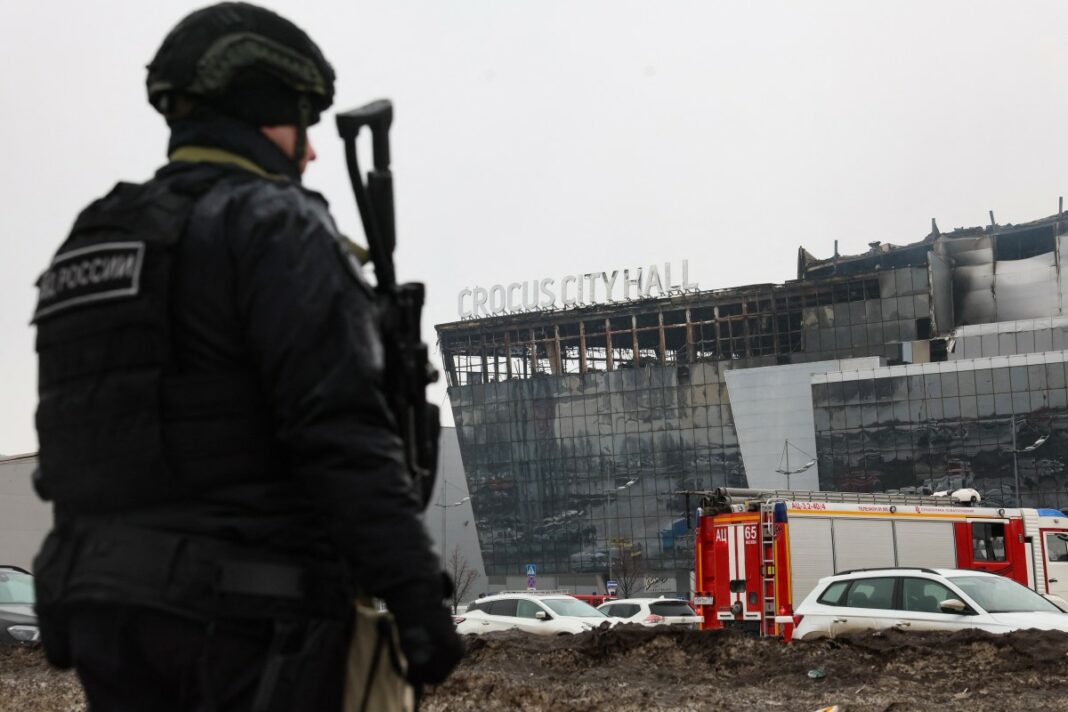Bünyamin Tekin
A person identified as one of the gunmen in an attack on a Moscow concert hall that left at least 133 dead and injured 120 others said he traveled to Russia from Turkey on March 4, according to a video of the suspect’s interrogation published by the Russian state-run RT news outlet.
The Islamic State in Iraq and the Levant (ISIL) claimed responsibility for the attack, with the group’s Telegram channel sharing photos of the attackers posing in front of an ISIL flag.
Amaq published the photo of those who carried out the attack in Moscow. This could also put an end to claims that the attack was carried out by Ukraine or that it was a false flag. pic.twitter.com/TQB4JfTXxQ
— Levent Kemal (@leventkemaI) March 23, 2024
Rescue workers continued to search the rubble of the Crocus City Hall, a popular concert venue on the outskirts of Moscow, after the attack, which has been described as the worst in Russia in almost two decades. The death toll has risen to 133, with more than 120 people hospitalized.
President Vladimir Putin condemned the attack and declared a day of national mourning. Putin also hinted at Ukrainian involvement, although he provided no evidence. Ukrainian officials have denied any connection to the incident.
The attackers reportedly used an unspecified flammable substance to start a fire at the venue, resulting in deaths from gunshot wounds and suffocation. The investigation committee has indicated that the death toll could rise further.
Authorities have detained 11 people in connection with the attack, including four suspected gunmen.
The attack began when gunmen in camouflage opened fire on concertgoers at Crocus City Hall, causing panic and chaos. The program featured a performance by the Soviet-era band Piknik.
UN Secretary-General Antonio Guterres and representatives of the United States, France, Turkey, Italy and the European Union expressed their condolences and condemned the violence.
Moscow attacker questioning:
Full transcript.
He claims that he arrived from Turkey on March 4.
– What did you do at Crocus?
– Shot them.
– Whom? By whose instructions?
– Of people.
– For what?
– For money.
– For how much money?
– About half a million.
– Half a million of… pic.twitter.com/LCq1ZYPohP— Ragıp Soylu (@ragipsoylu) March 23, 2024
In the recorded interrogation, one of the suspects, who spoke in Russian, confessed to firing the shots at the people in the concert hall “for money” and claimed he had received half a million rubles ($5,400). He said he had been recruited for the attack in Turkey by an assistant to a preacher.
Kerim Has, a political scientist and a Russia analyst, drew parallels between the attack and the assassination of Russian Ambassador Andrei Karlov in Ankara in 2016.
Karlov was shot dead by an off-duty policeman while speaking at an Ankara exhibit opening in December 2016.
The gunman, Mevlüt Mert Altıntaş, was killed by police at the scene.
The relations between the two countries were already strained at the time of the assassination due to Turkey’s downing of a Russian warplane on the Turkish-Syrian border a year earlier. Since Karlov’s murder, ties between Ankara and Moscow have seen steady improvement.
Altıntaş has become a “hero” among some factions of the Syrian opposition in Idlib as posters bearing his image taken during the incident were carried by crowds in a protest against Russian military attacks on the rebel-held Syrian town in 2018.
Has suggested that the attack may have been orchestrated by state actors aiming to destabilize Russia amid its war effort and potentially sow discord within Russia’s diverse ethnic and religious landscape.
“Turkey is being used as a breeding ground for such militants, where you have access to proxies over the counter,” Has said.
“Russia is not a monolith. It has a sizable Muslim minority, and many Muslims are fighting in the Russian army. The aim of this attack may have been to sow ethnic and religious discord in Russia, while Ukraine and its allies are losing their options on the ground, to the point where they are discussing the possibility of sending European soldiers to fight against Russia,” Has said.
“The coming days and Russia’s reaction will tell a lot, but I would say that Putin’s address to the nation was prudent,” he stated, adding that the Russian people are unlikely to fall into the trap of xenophobia and blame Muslims for the attack.

